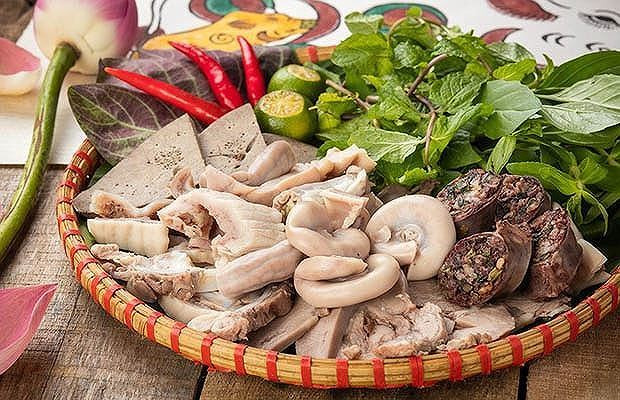If you don't want to get 'sick', don't eat pig intestines this way.
Pig intestines are a favorite dish of many people, however, not everyone knows how to eat pig intestines without harming their health or causing illness.
Animal organs (usually we eat pig organs, also known as pig intestines) are a favorite dish despite the risks they bring.
You can still enjoy this dish if you understand it well enough to limit the harm it can cause.
 |
Illustration: Internet |
Animal organs including kidneys, stomach, intestines, heart, tongue, and liver contain higher amounts of saturated fat and cholesterol than meat and if consumed in large amounts will increase blood fat which is harmful to the heart.
Especially for the elderly, obese people and people with metabolic disorders: diabetes, high blood pressure, gout...
Below are absolute taboos to avoid to keep your pork offal dish safe and appealing.
Absolutely do not use pig intestines overnight.
Food can easily become contaminated again no matter how carefully and thoroughly it is cleaned. Furthermore, pig intestines left overnight can easily become rancid or develop an unpleasant odor. It is best not to leave them, and to throw away any leftovers.
Don't eat too much pork offal.
Nutrition experts recommend that each person should only eat 2-3 times/week, each time eating about 50-70g for adults; 30-50g for children. People with diabetes, high blood pressure, heart disease should absolutely not eat pig intestines, because they can easily make the condition worse.
Risk of infection
According to many proven studies, pig organs such as liver, heart, stomach, kidney... have high calorie content. When eating pig intestines that are not cleaned and cooked properly, they can easily become "bacteria nests" causing dangerous diseases such as typhoid, dysentery, cholera and even hepatitis.
If you eat pig intestines that are not cleaned and cooked properly, parasites will enter the body and cause the dangerous diseases mentioned above.
Do not eat organs of unknown origin
According to authorities, there is currently a situation in the market where traders smuggle animal organs of unknown origin, even spoiled, or offal from pigs that died of disease, especially at the time when African swine fever is raging, into processing facilities.
This type of organ has many potential health risks, so when eating organs you need to know the origin of the food you eat, avoid buying or mistakenly eating the above scary foods.

Do not eat undercooked organs
Animal organs are easily contaminated and can be a hotbed of bacteria that cause cholera, dysentery, typhoid, tuberculosis, anthrax, hepatitis... At the same time, they can also be infected with many types of parasites such as tapeworms, dog tapeworms, roundworms...
If the internal organs are not carefully prepared and fully cooked, these bacteria and parasites can enter the human body, causing many terrible diseases.
Increased risk of terminal illness
Pork intestines are a very nutritious protein-rich food, but at the same time they also contain a lot of bad cholesterol, uric acid...
Eating a lot of pork offal will increase the risk of incurable diseases such as gout, diabetes, cardiovascular disease, high blood pressure... They will actually make people with gout, cardiovascular disease, diabetes, and high blood pressure worse.
Risk of streptococcal infection
If pigs are infected with Streptococcus suis (S.suis) (including sick pigs and healthy pigs that carry the bacteria without developing the disease), the blood (blood), intestines, internal organs and pork meat will contain a large amount of bacteria. When eating uncooked pork products such as blood pudding, intestines, nem chua, porridge..., the streptococcus bacteria from that food will enter the human body and cause disease.
It is known that many patients with streptococcus suis disease are due to eating raw pig blood pudding. Infected people have symptoms of encephalitis, hemorrhage, pneumonia, myocarditis and arthritis.
People with these diseases often have serious health consequences and even worse, can die.
Do not eat offal if you are obese or have heart disease.
According to nutritionists, internal organs contain a lot of protein but also a lot of fat, especially very high cholesterol content, especially in the brain, liver and kidney of pigs.
For the elderly, people with metabolic disorders such as hypercholesterolemia, atherosclerosis, diabetes, gout, overweight, obesity... need to abstain absolutely.
Pregnant women should not eat heart.

As we know, animal organs of unknown origin have the potential to be infected with bacteria, viruses, and parasites (worms, flukes) that can transmit diseases to humans.
In addition, if the liver of livestock is not hygienic (due to eating moldy animal feed), there is a high risk of contamination with the mycotoxin Aflatoxin - a substance that can cause liver cancer in humans.
In particular, if pigs are infected with Streptococcus suis (including sick pigs and healthy pigs carrying the bacteria without developing the disease), the blood (secretion), intestinal organs and pork meat will contain a large amount of bacteria.
When eating uncooked pork products such as blood pudding, intestines, nem chua, intestine porridge, etc., streptococcus bacteria from that food will enter the human body and cause disease. This is extremely harmful to the health of pregnant women.
